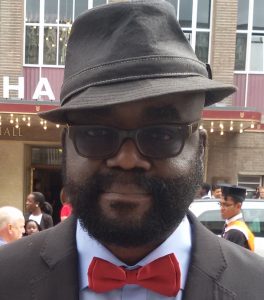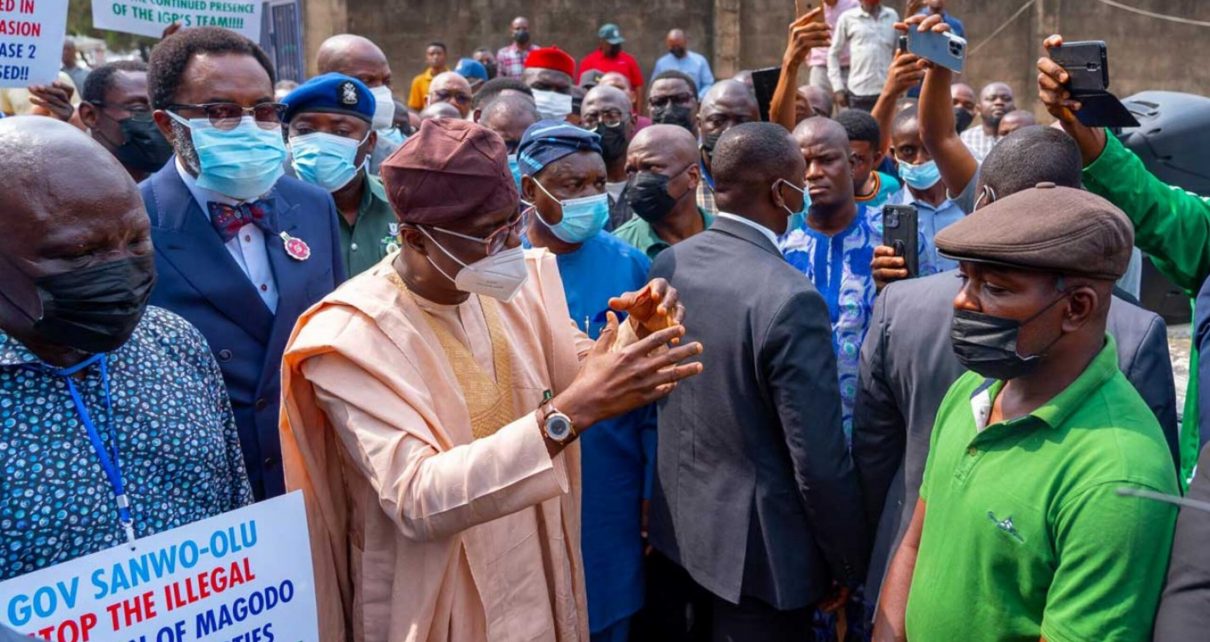
A wagging tail is usually found at the rear end of an excited dog, but a wagging dog in front of a static tail? Only in Nigeria, where the barrack mentality of military dictatorship has been smuggled into the unitary constitution to reduce the people to subjects and their elected local leaders to paper tigers.
What happened in Lagos last week when, without reference to the state governor, the federal Attorney-General deployed armed policemen from Abuja to a residential estate in Lagos, was unprecedented. The deployment could have led to wanton bloodshed, but the governor displayed commendable sagacity in not letting the situation get out of hand.
Chief security officer my foot! There is no greater evidence of the fraudulent nature of the 1999 constitution than the designation of governors as Chief Security Officers of their states when in actual fact, they are, at best, generals without troops. Nigerian governors are nothing but mere local prefects without any power over their own security and the security of the people they govern. That’s why a police chief superintendent will defy an elected governor of a state of 20 million people.
Anyone still in doubt about the need for state policing must have other motives other than security of lives and property. The voices of governors Nasir el Rufa’i and Rotimi Akeredolu, both members of the governing APC, are most strident about the need for states to have their own police to maintain law and order. But the federal government wants to continue running the country as one huge barrack with command and control flowing from one overwhelmed central source.
Akeredolu, a Senior Advocate of Nigeria (SAN) who chairs the Southwest Governors’ Forum, roundly condemned the Lagos incident as another proof of the incongruity of the current ‘federal’ structure where the tail wags the dog: “An arrangement, which compels the governor of a state to seek clarifications on security issues in his jurisdiction from totally extraneous bodies or persons is a sure recipe for anarchy… We, on our part, will continue to interrogate the current system, which treats elected representatives of the people as mere prefects, while appointed office-holders ride rough shod over them as Lords of the Manor.”
“… If Supreme Court gives a judgement and the state disobeys, the next action is to file contempt proceedings, not resort to self-help by importing policemen from Abuja to Lagos to chase people out of their houses. That is a recipe for anarchy and Malami and fellow travellers ought to know that if indeed their interest in this matter is about public good.”
The unitary system being operated in Nigeria in the name of federalism is the cause of most of the security and development problems the country has. The federal government itself is not famous for obeying court orders (ask El Zak-Zakky and others). The attorney-general’s claim that he was only protecting the rule of law by trying to enforce a supreme court judgement is a fib best told to the marines. Did it not take a court order to force the federal government to declare bandits as terrorists?
The argument that state governors will misuse any security force under their power is equally fraudulent. The greatest champion of impunity and self-help in Nigeria over the years is the federal government — and no one has suggested that we should strip the federal government of the power to control forces of coercion.
Indeed, Segun Adeniyi, frontline Nigerian journalist, author and columnist, wondered how the police authorities, who are already buffeted on many fronts, decided to add Magodo to their problems: “It ought to concern the rest of Nigerians”, argues Adeniyi, “that a police force faced with widespread insecurity across the nation can draft a huge contingent to Lagos for over two weeks to enforce a doubtful mandate. Clearly, the Magodo matter has once again exposed the hollow reign of narrow interest in today’s Nigeria.”
Let it be restated for the umpteenth time that we have always had local police before military intrusion into our affairs. I fondly recall that during the First Republic we had federal, regional and local police. Each had its jurisdiction; all collaborated whenever necessary. The argument being made by those who feel advantaged by the current hopeless unitary system shows that they think that the federal government is a kind of overlord managing recalcitrant children.
That kind of thinking flows directly from a philosophical position of a divine right of sorts. It can be seen in how the shift from parliamentary democracy to presidential system has birthed another monster: a Kabiyesi presidency which confuses the modern concept of a president as chief executive with the monarchical, unquestionable, ‘rights’ of a despotic king.
That is precisely why those in power think they are doing the nation a favour. Once in power, they become fiefs, no longer responsible to the people but above the people. Since 1999 when “Baba Obasanjo” came on the democratic scene, what Nigeria has been operating is Babacracy — government of Baba, for Baba and by Baba. Baba is infallible. Baba is a gift to Africa. Long live Baba!
Which modern democracy operates that way?
Some states in Nigeria are bigger and more populous than several countries in Africa and Europe. To argue that their governors are mere children who cannot be trusted with managing their own security is an insult for which I blame not only the executive arm of the federal government but, more importantly, the legislature which has the power to correct the many anomalies in the constitution, even if piecemeal, until a proper conference to comprehensively address the issue of keeping Nigeria one in a sustainable way, is held.
President Buhari had, in his recent interview with Channels TV, stated that handing over local security to traditional rulers will solve the problem of insecurity. Is he talking about the same traditional rulers who are being kidnapped left, right and centre? No modern society works that way.
Once upon a time, man was a hunter-gatherer. Over time, man began to settle down in social groups. The innate need for interconnectedness made man form communities which, with time, became distinct societies. In the modern world of sovereign states comprising various cultures, it is the duty of the government to assist those still mired in ancient ways to leapfrog into modernity and enjoy its benefits like their other compatriots. The alternative is the current untenable situation of embarking on a futile search for non-existent grazing routes in order to federalise roaming in the wilderness in the name of cattle rearing.
To make progress, we don’t have to remain rooted at the spot our forebears left off. We cannot continue tilling the soil of our collective development with the rusty hoes inherited from pre-history. The rest of the world is cultivating, nurturing and investing in their youth to become technological natives.
At the said interview, President Buhari advised youths not to think that the government owes them a job when they graduate. I don’t think our youths are even interested in government jobs if governments at all levels do their own jobs competently and provide a conducive environment for creativity to flourish. We ought to ask ourselves why our youths excel the moment they cross our borders to other climes where there is security of lives and property, efficient municipal facilities and rule of law. Truth be told, there is a sense in which governments at local, state and federal levels can be said to be the stumbling block between the youths and the realisation of their dreams.
We can borrow a fairly used idea from those who have developed their own human resources and become reference points in the world today.
In his New York Times article titled “Pass the books: Hold the oil”, Thomas L. Friedman argues that the way to sustainable development is to follow the example of a place he describes as his favourite country, Taiwan— “Rather than digging in the ground and mining whatever comes up, Taiwan has mined its 23 million people, their talent, energy and intelligence — men and women… Sure, it’s great to have oil, gas and diamonds; they can buy jobs. But they’ll weaken your society in the long run unless they’re used to build schools and a culture of lifelong learning.”
Friedman buttresses his point with a quote from the well known mathematician and researcher, Andreas Schleicher: “Knowledge and skills have become the global currency of 21st-century economies, but there is no central bank that prints this currency. Everyone has to decide on their own how much they will print…”
I commend these wise words to the Nigerian President.
- Wole Olaoye is a public relations consultant and veteran journalist. He can be reached on wole.olaoye@gmail.com, Twitter: @wole_olaoye; Instagram: woleola2021


